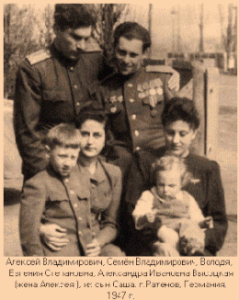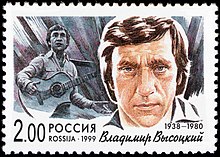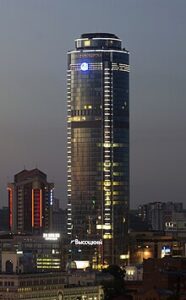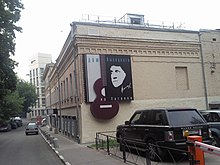Vladimir Vysotsky is a legend of Soviet music, theater and film. The author’s songs have become classics and unquestionable immortal hits. His work is difficult to define, as he always went beyond and enlarged them. The musician’s compositions are categorized as bard music, although his way of presentation and the topic of the words were radically different from those allowed in the bard context. The musician himself did not consider himself a member of this movement.
Childhood and youth
Vladimir Semenovich Vysotsky was born on January 25, 1938 in Moscow in a vast communal apartment. The poet’s father Semyon Vladimirovich is a bard and performer, a native of Kyiv, a soldier of the Great Patriotic War, and his mother Nina Maksimovna is a translator and referent. The parents decided the name for the heir well before birth. When the conflict began, Volodya was just 3 and a half years old. Mom chose to depart with her kid for the Orenburg area. Vysotsky resided there for almost two years, and after the evacuation the family came back to Moscow.
2 years after the conclusion of the war, the parents split. Vladimir spent several years of his boyhood in post-war Germany, occupied by Soviet forces. There the youngster got piano lessons. His mother remarried, and Vysotsky had a terrible relationship with his stepfather. His own father also married a second time, but the musician had a stronger connection with his stepmother.
The adolescent returned to Moscow in 1949, residing with his father and his wife. It was then that Vysotsky met music, or rather, the happy youth of the 50s, who pushed him to sing. Vladimir’s first chords are the reasons of thieves’ romance, a typical tendency for people whose youth was spent during the war. In the nights, groups gathered to play songs about Kolyma, Vorkuta and Murka on the guitar. Then Vysotsky began a serious romance with the guitar.
At the age of 10, Vysotsky began attending a theatrical group. Then he still did not entirely comprehend that his destiny belonged to the theater. After graduating from school, he enrolled a Moscow construction school, but six months later he understood that he was in the wrong location and quit the educational institution.
According to folklore, Vladimir did this unexpectedly and somewhat eccentrically. The future actor and a classmate spent the whole New Year’s Eve preparing for the session, producing sketches, without which it was impossible to acquire admittance to the tests. After several hours of tedious effort, the designs were finished – and then Vysotsky snatched a can of ink off the table and spilled it over his page. The young guy understood that he could no longer continue at this educational institution, and chose to spend the remaining six months preparing for his new enrollment.
After this, the young dynamic person attended the Moscow Art Theater School and after 3 years he made his debut on the theater stage in the educational play “Crime and Punishment.” Then Vladimir performed his first role in the film “Peers”.
Theater
After graduating from the Moscow Art Theater School, Vysotsky moved to work at the Alexander Pushkin Theater . Soon he went to the Theater of Miniatures, acted there in minor episodes and extras, which did not excite enthusiasm. There were also unsuccessful efforts to break into Sovremennik.
As a result, Vladimir enjoyed the Taganka Theater, in which he worked until his death. Here Vysotsky experimented on the portraits of Pugachev , Svidrigailov and Galileo . The actor toured a lot with the Taganka Theater. He went all over the world, performed in France, Poland, and Germany. I was able to fly to the USA multiple times, visited Mexico, Canada and Tahiti.
In the 70s, at the Taganka Theater he was either fired for intoxication, then again authorized for the big parts. Vysotsky almost died multiple times owing to a weak heart, overwork and protracted binges. But at the same time, Vysotsky portrayed Hamlet , which was remembered by millions. Vladimir embraced the most difficult and attractive part in his own style and with boundless skill.
Music
Vladimir Vysotsky created the words for the songs himself. I composed my first poems while still in school. The teenage poet dedicated the poem “My Oath” to Joseph Stalin and in a beautiful manner grieved the death of the leader. The songwriter himself named “Tattoo” his debut song, which was played in Leningrad in 1961. This piece begins a cycle of works by courtyard, thieves in the poet’s oeuvre.
Despite the artist’s comments, there is another song of his, dated a year earlier, called “49 days.” The author termed this composition a guidebook for hacks and talked critically about it. According to Vysotsky, you may write numerous similar poems by opening the events section of the newspaper and altering the names. It was crucial for the poet to let creation flow through himself, thus he did not recognize the “hacky” song “49 Days.”
Vladimir Vysotsky took his authorial inspiration from Bulat Okudzhava , whom he regarded a mentor till the final day of his life. “Song of Truth and Lies” was dedicated to him. The actor began creating music and lyrics in the 60s, but blossomed as a musician later. In 1965, “Submarine” became a symbol that the early poet’s young career was done. Later, the actor created music for films in which he acted and assisted in their development.
In 1968, the first gramophone record containing Vysotsky’s original works was issued. It was a compilation of songs for the film “Vertical,” including “Song about a Friend,” which was originally heard in this film and eventually became one of the musician’s calling cards.
Soon the musician made a new album “V. Vysotsky. Self-portrait.” It was a collection of the author’s digressions before each number and accompaniment on three guitars. But the recording was partially published and only after the death of the author.
In 1978, Vladimir Vysotsky won the highest category of pop vocalist. This proved that the Ministry of Culture is faithful to the bard’s work and is ready to acknowledge him as a professional artist.
The following year, the musician toured a lot, performing in New York and Toronto. Vysotsky’s songs impressed listeners so much that in law-abiding America in the same year, without the permission of the singer himself, a pirated recording of the concert was released with the order of the compositions mixed up.
Vysotsky continued to travel. In France, he met a gypsy musician, with whom he sang many songs and romances in a duet. The singers planned to produce a record, but Vladimir did not have time to achieve this.
In the latter years of his life, the artist did not cease performing concerts. He played in Leningrad, Kaliningrad and Moscow, and continued to portray Hamlet at the Taganka Theater.
The musician and poet’s repertoire includes more than 600 songs, as well as about 200 poems. His concerts were attended by crowds of fans. The musician gave more than 1.5 thousand concerts around the world. During his lifetime, Vysotsky released 7 of his own albums and 11 collections of songs by other musicians performed by him.
It is difficult to construct an official discography of all the albums and collections in which Vysotsky participated, as they were published in different countries, withdrawn from sale, and rewritten. After Vysotsky’s death, his compositions continued to be issued on recordings.
Movies
In the biography of Vladimir Vysotsky, theater, cinema and music were equally intertwined. Vysotsky played his first episodic role in the film “Peers” while still studying. But Vladimir Semenovich truly discovered cinema as an actor in 1961 after filming the film “Dima Gorin’s Career.” Then came “713 Requests Landing” and other films. But there were no main roles, Vysotsky began to abuse alcohol. This turned a lot of things around for the worse.
Serious success came only with the publication of the film “Vertical,” for which he created all the tunes, including the renowned “Song about a Friend.” The whole country suddenly knew about Vysotsky, both as an actor and as a musician.
Vysotsky’s songs were criticized by the CPSU Central Committee and the subordinate press. Vladimir Semenovich could not ignore this, and after caustic articles on the topic of what he was singing about, he sent a letter to the Central Committee, where he called this criticism undeserved and unsubstantiated.
The darling of millions, Vladimir Vysotsky, was loathed by the Soviet state. His songs were not broadcast, he was often denied jobs, thus during the 70s the actor did little filmmaking. But the artist’s renown only rose.
The program “The Guy from Taganka”, dedicated to Vysotsky, was broadcast on Estonian television. This was the artist’s first appearance on screens other than in a feature film. A lot has been written and filmed about the actor. An article about him was published in the Theater magazine, and later Vysotsky was invited to perform on a French television channel, where he performed his biographical “Ballad of Love.” But not a single interview or concert of Vladimir Vysotsky was shown on Central Television during his lifetime.
Sometimes there were attempts to record interviews for the CT. For example, Vysotsky chatted with Valery Perevozchikov, but afterward the film with the transfer was wiped away, leaving nothing save a little last segment for a few minutes.
A landmark role for Vladimir Vysotsky was his work in the multi-part film “The Meeting Place Cannot Be Changed ,” where the actor played his favorite hero Gleb Zheglov , and also partially acted as director. In this film, Vladimir Semenovich’s songs are not heard, although he initially expressed such a desire. However, director Stanislav Govorukhin was against such creativity, since, in his opinion, the charismatic Vysotsky could overshadow the image of his hero.
Vladimir Vysotsky truly wanted to feature in the American film “Reds”. He recorded a video message to Warren Beatty , who was to direct the film. But the tape never reached the United States.
Books
During the author’s lifetime, his works were secretly banned from publication. In 1975, for the first and, as it turned out, the last time, a poem by Vysotsky was published in an official Soviet collection. The verse “From a Travel Diary” was lucky. But the poet’s friends and colleagues found ways to introduce the reader to the works they liked. Thus, some of them ended up in plays or literary opuses of other authors as quotes. And the provincial press even took it upon itself to print texts that officially appeared on Melodiya records.
Vladimir Vysotsky took part in the creation of the famous samizdat almanac “Metropol”. It was an uncensored publication, a collection of texts by those authors who could not be published officially. A total of 12 copies were published, but someone was able to illegally take one of them to the USA, where the almanac was published.
In the last years of his life, Vysotsky managed to work on the book “Black Candle”, where Leonid Monchinsky was his co-author. Together they visited the Irkutsk region, in Bodaibo, a place where former prisoners were engaged in gold mining. The poet planned to turn the whole story into a script for a film, but a colleague convinced him to write a book first. During the life of the bard, the first part, “Escape,” was created; subsequently, “Shoot, Citizen Boss!” appeared. The novel was released into wide circulation only in the 90s.
Personal life
Love was an important component of the work of the great poet and musician. There was always a woman next to him, a muse, to whom he often dedicated songs. The truth is always different. There was a lot in the celebrity’s personal life – incredible feelings, betrayal, and even an illegitimate daughter.
Iza Zhukova
When Vladimir Semenovich was a 1st year student, he met fellow student Iza Zhukova , who eventually became his first wife. True, they could not get married right away – at the time the novel began, Isolde was married and for some time could not get a divorce. And then there was a separation in their lives, the girl went to Kyiv to work on assignment. Vysotsky went to see his beloved every week.
Finally, in 1960 they got married. But living together did not last long, the pair regularly quarreled and soon decided to separate.
Lyudmila Abramova
The actor’s second wife was Lyudmila Abramova . They met, according to family legend, leaving a restaurant. The man did not have enough money to pay for dinner, but the stranger responded to his request and gave her ring as collateral. The next day, the actor brought the required amount and returned the jewelry to Lyudmila.
Later it turned out that he and Abramova were connected by filming in the same film. Such machinations of fate were not accidental – they soon began to live together, and two sons were born in the actual marriage. Both heirs of Vysotsky later also became artists and connected their lives with cinema. The youngest son, Nikita Vysotsky , manages the State Cultural Center-Museum of V. S. Vysotsky. He was the author and producer of the biographical film “Vysotsky. Thank you for being alive” .
Vysotsky adopted Lyudmila as his wife following the birth of their children – in 1965. But this coupling was doomed – in 1968, Arkady and Nikita’s parents split.
Tatiana Ivanenko
The bard had an unofficial relationship with Tatyana Ivanenko – the romance began about 1966 and was fairly long-lasting. The public knows little about Ivanenko; she was reared in a military household, thus her unique qualities were drive and confidence. The adored accompanied her chosen one on different film adventures.
In 1972, Tatyana gave birth to a daughter, Anastasia Ivanenko . Colleagues subsequently expressed confidence that the girl’s father was Vysotsky. Vladimir Semenovich was still in this relationship when he met Marina Vladi , and at the time of the birth of the heiress he was already married to her. But Tatyana did not instantly identify her adversary in the actress, and then hoped for a family reunion.
Marina Vladi
Vysotsky initially saw his future bride in the film “The Witch” and immediately fell in love. The musician dreamed about this woman while assessing the film with her involvement. Their acquaintance eventually happened. One day, after attending a performance, Vladimir Semenovich entered a restaurant where Vladi was relaxing. Then the actor walked right to her, grasped her hand and did not take his eyes from Marina. In 1970, Vladi and Vysotsky were married.
Vladimir Vysotsky’s personal life was then flipped upside down, and his old fantasy came true. This continued on for 10 years, until the musician’s death. During this moment, Marina Vladi remained for the actor not only his cherished woman, support, but also his major muse.
But in this household everything was not that easy. Vysotsky had a scandalous image; there were numerous stories about him and his ladies. Already in our time in the biography “Vysotsky. Thank you for being alive” tells about the artist’s romance with a certain Tatyana Ivleva in the last years of his life. A girl with that name never existed, and her prototype in the film was Oksana Afanasyeva, the artist’s last muse.
Oksana Afanasyeva
In the latter years of her life, Oksana Afanasyeva was close to Vysotsky. He fell in love by coincidence and at first sight. As Oksana subsequently claimed, he became her first and, perhaps, only genuine love. The difference between the lovers was more than 20 years. Oksana was the daughter of a writer, thus she did not experience any awe of superstars. She was far more frightened that for a popular singer with a reputation as an alcoholic and a womanizer, she would become merely entertainment. But they were actual affections with gentle wooing and admiration.
Vysotsky’s wife at that time lived her life in Paris, but knew of her husband’s mistress. Oksana even moved into Vladimir’s flat, she knowing that he was married. The musician cheated on her too. Vysotsky did not disguise his connection and freely presented the girl to his friends and coworkers.
Dependencies
Vladimir Vysotsky, despite his confident look, was not in excellent health. The artist smoked a pack of cigarettes a day and was dependant on booze for many years. He was a creative individual, yet his works were continuously condemned, stifled and postponed. With all this, he helped me stop drinking or at least establish friends. He grabbed them throughout the city at moments of exacerbation, convinced them, and gave them medicines that Marina had brought from France. The musician’s associates stated that in the later years of his life, Vysotsky himself quit consuming alcohol.
However, the artist had troubles with his heart and respiration. The first significant assault happened in 1969. His throat began to bleed, and his horrified wife summoned an ambulance. At first, physicians even refused to hospitalize the singer, believing his situation deadly, but Vladi barred the door for them and threatened them with a diplomatic scandal. Vysotsky was rescued by his wife’s insistence and the fact that medics knew the singer and actor. The surgery lasted 18 hours.
Alcohol abuse has effects, including renal and heart damage. Doctors sought to battle serious illnesses using narcotic drugs. It is uncertain if this became the root of the addiction, or whether the musician himself thought that drugs would help him give up alcohol and manage with the condition, but the truth remains: by the mid-70s, Vysotsky had acquired a drug addiction. He continually raised the amounts of morphine and amphetamine, and by 1977 he could no longer exist without regular drug usage.
At that time, the artist was already doomed, attempts at therapy had little impact, and Vysotsky was projected to have a catastrophic conclusion for a number of years, either from an overdose or from withdrawal. In 1979, in Bukhara, Vysotsky may have encountered clinical death. Biographers are still disputing about this fact.
Death
On July 25, 1980, Vladimir Semenovich died unexpectedly. Death occurred in a dream at the apartment where the musician resided. The artist hurried around the room and informed his mother: he knows that he would die that day. Vysotsky fell asleep only after getting a sedative injection and died in his sleep.
At the request of family, an autopsy was not done, hence the actual cause of death has not been verified. According to numerous reports, it may be inferred that the poet, singer and gifted actor died of myocardial infarction or suffocation due to an overdose of sedatives. Friends and his wife admitted that Vysotsky was murdered by drugs, although they did not name an overdose as the probable cause of death. In the official conclusion, the interpretation is as follows: abrupt cardiovascular failure.
The death of the bard was not announced in newspapers or on television. This happened not so much because he was a poet detested by the government, but because of the timing of his death – the artist died during the Summer Olympics in Moscow. Nobody wanted to disrupt a worldwide occasion with an obituary. The statement was displayed in the box office window of the Taganka Theater, and a throng soon formed around the building.
Information about the funeral was kept quiet, yet the whole city gathered to bid farewell to the musician. As Marina Vladi subsequently told it, even monarchs were not buried this manner. To get to the Vagankovskoye cemetery, the casket containing Vysotsky had to pass by the Kremlin. The official authorities tried to wash away the flowers and knock down the painting so that it would not be evident who was being carried through the center of Moscow, but before that, the quietly weeping throng came to the defense of the procession. People covered flowers with umbrellas and yelled at the cops. Photos of this catastrophe spread around the world.
In order for the famous artist to be buried near the entrance, the director of the cemetery had to forfeit his post. The poet’s tomb was simply strewn with flowers.